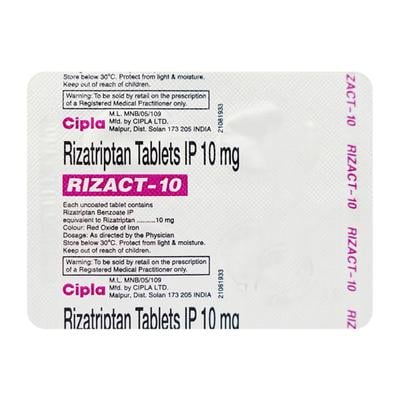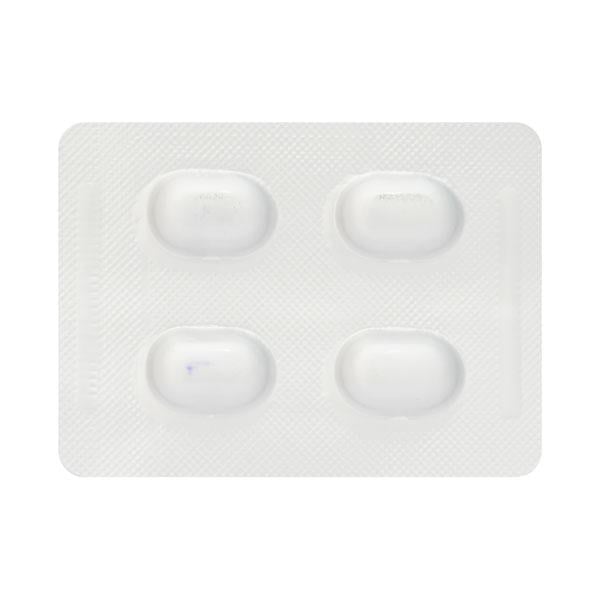

Netmeds First Membership
Quick Links
Introduction About RIZACT 10MG TABLET
RIZACT 10MG TABLET contains Rizatriptan which belongs to the group of medicines called Selective serotonin 5-hydroxytryptamine receptor agonist. RIZACT 10MG TABLET is used in adults to manage headache phase of migraine attack.
RIZACT 10MG TABLET is not recommended for use in patients allergic to Rizatriptan. It is also not recommended for use in patients suffering from moderate/mild/severe high blood pressure (which is not controlled by medication), stroke, peripheral vascular disease (condition marked by blockage of blood vessels), heart problems (such as heart attack, angina), and/or severe kidney/liver problems.
Before taking RIZACT 10MG TABLET, inform your doctor if you have diabetes, family history of heart disease, headache (associated with dizziness, difficulty in walking, lack of coordination), short lived symptoms (such as chest pain, tightness), and/or mild to moderate kidney/liver problems.
RIZACT 10MG TABLET should be used with caution during pregnancy and in women planning for pregnancy only if it is clearly necessary as it is not known whether the medicine can cause harm to the unborn baby. It is also used with caution in breastfeeding women only if it is clearly necessary. Breastfeeding mothers should avoid nursing the child for next 24 hours after taking the medicine since it may cause unwanted effects in the nursing child.
RIZACT 10MG TABLET is not recommended for use in children and adolescents (aged below 18 years) and is advised to be used with caution in elderly patients (aged 65 years/above) after consulting the doctor.
The most common side effects of taking RIZACT 10MG TABLET are tingling sensation of hands/feet, headache, sleeplessness, dry mouth, nausea, vomiting, and/or diarrhea. Consult your doctor if any of these symptoms worsens.
Uses Of RIZACT 10MG TABLET
- Manage headache experienced during migraine attack in adult patients
How RIZACT 10MG TABLET Works
RIZACT 10MG TABLET works by constricting the blood vessels that surround the brain which results in reduced swelling in the blood vessels thus providing relief from headache that occurs in migraine attack in affected individuals.
How to use RIZACT 10MG TABLET
Tablet
Take RIZACT 10MG TABLET as advised by your physician. Swallow the medicine with a glass of water. Do not crush or chew the medicine. Your doctor will decide the correct dose and duration for you depending upon your age, body weight and disease condition.
Oral Disintegrating Tablet / Mouth Dissolving Tablet:
Take RIZACT 10MG TABLET as advised by your physician. Place RIZACT 10MG TABLET inside your mouth and allow it to dissolve completely. Do not swallow or chew the medicine. Your doctor will decide the correct dose and duration for you depending upon your age, body weight and disease condition.
Side Effects Of RIZACT 10MG TABLET
Common
- tingling sensation of hands/feet, headache, decreased sensitivity of skin, decreased mental sharpness
- sleeplessness
- fast/irregular heartbeat
- flushing
- throat discomfort, dry mouth, nausea, vomiting, diarrhea, indigestion
- feeling of heaviness in parts of the body, neck pain, stiffness
- pain in abdomen/chest
Uncommon
- bad taste in mouth
- ataxia (unsteadiness while walking), dizziness, tremor, fainting
- blurred vision
- confusion, nervousness
- high blood pressure
- thirst, sweating
- rash, itching, and/or red itchy welts
- swelling of face/lips/tongue, and/or throat
- feeling of tightness in parts of the body, muscle weakness
- changes in the rhythm/rate of the heartbeat
- very fast heartbeat
- facial pain, muscle pain
Rare
- wheezing
- allergic reaction
- anaphylaxis (sudden life-threatening allergic reaction)
- stroke (especially in patients with risk factors for heart and blood vessel disease)
- slow heartbeat.
Stop taking RIZACT 10MG TABLET and consult your doctor immediately if you experience any of the following:
- signs of an allergic reaction such as swelling of the face/lips/tongue, shortness of breath, rash, itching, and/or red itchy welts
- signs of serotonin syndrome (serious drug reaction) such as agitation/restlessness, sleeplessness, confusion, and/or dilated pupils
- heart attack
- signs of stroke (condition that occurs due to poor blood supply to brain) such as sudden numbness/weakness in face/arm/leg, trouble speaking, dizziness, and/or loss of balance
How To Manage Side Effects
Headache:
If RIZACT 10MG TABLET causes headache, then take rest and drink plenty of fluids. Try to avoid drinking alcohol. Ask your doctor to recommend a painkiller. Headaches should usually go away after the first week of taking RIZACT 10MG TABLET. If it lasts more than a week or severe, inform your doctor.
Dry mouth and thirst:
Try to drink plenty of cold water and sip on cold unsweetened drinks and use lip balm if your lips are dry. Brush your teeth twice a day and use mouthwash. Consult and inform your doctor if the symptom gets worse.
Warning & Precautions
Pregnancy
RIZACT 10MG TABLET should be used with caution during pregnancy and in women planning for pregnancy only if it is clearly necessary as it is not known whether the medicine can cause harm to the unborn baby. Consult your doctor before taking the medicine.
Breastfeeding
RIZACT 10MG TABLET should be used with caution in breastfeeding women only if it is clearly necessary. Breastfeeding mothers should avoid nursing the child for next 24 hours after taking the medicine. Consult your doctor before taking RIZACT 10MG TABLET.
Driving and Using Machines
Do not drive/operate machines if you feel dizzy/sleepy after taking RIZACT 10MG TABLET. Consult your doctor before taking the medicine.
Kidney
RIZACT 10MG TABLET is not recommended for use in patients with severe kidney problems. It should be used with caution in patients with mild to moderate kidney problems. Consult your doctor before taking RIZACT 10MG TABLET.
Liver
RIZACT 10MG TABLET is not recommended for use in patients with severe liver problems. It should be used with caution in patients with mild to moderate liver problems. Consult your doctor before taking RIZACT 10MG TABLET.
Allergy
Do not take RIZACT 10MG TABLET if you are allergic to Rizatriptan, and/or any other ingredients of this medicine.
Heart Disease
RIZACT 10MG TABLET is not recommended for use in patients with heart problems such as heart attack, angina. It should be used with caution in patients with other heart problems such as bundle branch block. Consult your doctor before taking RIZACT 10MG TABLET.
Others
RIZACT 10MG TABLET is not recommended for use if you:
- have moderately/mild/severe high blood pressure which is not controlled by medication
- have had a stroke
- suffer from peripheral vascular disease (condition marked by blockage of blood vessels).
Before taking RIZACT 10MG TABLET, inform your doctor if you:
- have diabetes
- are a smoker
- have a family history of heart disease
- are a man aged above 40 years or women in postmenopausal phase
- suffer from headache associated with dizziness, difficulty in walking, lack of coordination, and/or weakness in the leg and arm
- have had short lived symptoms such as chest pain, tightness.
Use in Pediatrics:
RIZACT 10MG TABLET is not recommended for use in children and adolescents (aged below 18 years). Consult your doctor before taking the medicine.
Use in Geriatrics:
RIZACT 10MG TABLET should be used with caution in elderly patients (aged 65 years/above). Consult your doctor before taking the medicine.
Interactions
A. Drug-Drug Interactions
Before taking RIZACT 10MG TABLET, inform your doctor if you are taking any of the following medicine:
- other triptans (medicines used to manage migraine) Ex. ergotamine, dihydro-ergotamine, sumatriptan, naratriptan or zolmitriptan
- medicines used to manage depression such as selective serotonin reuptake inhibitors (SSRIs) (Ex.sertraline, escitalopram oxalate, uoxetine), serotonin noradrenaline reuptake inhibitors (SNRIs) (Ex. venlafaxine, and duloxetine), monoamine oxidase (MAO) inhibitors (Ex. moclobemide, phenelzine, tranylcypromine, pargyline)
- medicines used to manage bacterial infections (Ex. linezolid)
- propranolol (used to manage heart problems, anxiety)
- methysergide (used to manage migraine)
Overdosage:
If you or anyone else accidentally takes too much of RIZACT 10MG TABLET, visit the nearby hospital or consult your doctor immediately. Symptoms of overdose are dizziness, drowsiness, vomiting, fainting, and/or slow heart rate.
Synopsis
| Drug | : | Rizatriptan |
| Pharmacological Category | : | Selective serotonin 5-HT1B/1D receptor agonists |
| Therapeutic Indication | : | Headache in migraine |
| Dosage Forms | : | Tablet, Oral Disintegration Tablets |
More Information
- Keep RIZACT 10MG TABLET out of sight and reach of children
- Do not store RIZACT 10MG TABLET above 30°C
FAQs About RIZACT 10MG TABLET
What is RIZACT 10MG TABLET and why it is used?
RIZACT 10MG TABLET contains Rizatriptan which belongs to the group of medicines called Selective serotonin 5-hydroxytryptamine receptor agonist. It is generally used to manage headache phase of migraine attack in adult patients.
What are the common side effects of RIZACT 10MG TABLET?
The most common side effects of taking RIZACT 10MG TABLET are tingling sensation of hands/feet, headache, sleeplessness, dry mouth, nausea, vomiting, and/or diarrhea. Consult your doctor if any of these symptoms worsens.
Can RIZACT 10MG TABLET be used in pregnant and breastfeeding women?
Yes, RIZACT 10MG TABLET can be used but with caution in pregnant and breastfeeding women only if necessary since it is not known whether the medicine can cause harm to the unborn baby/nursing child. Consult your doctor before taking the medicine.
How RIZACT 10MG TABLET works?
RIZACT 10MG TABLET works by constricting the blood vessels that surround the brain which results in reduced swelling in the blood vessels thus providing relief from headache that occurs in migraine attack in affected individuals.
What happens if RIZACT 10MG TABLET is taken more than its required dosage?
If you or anyone else accidentally takes too much of RIZACT 10MG TABLET, visit the nearby hospital or consult your doctor immediately. Symptoms of overdose are dizziness, drowsiness, vomiting, fainting, and/or slow heart rate.
References
1. KD. Tripathi. 5-Hydroxytryptamine, its Antagonists and Drug Therapy of Migraine. Essentials of medical pharmacology. Seventh edition. Page- 179.
2. Offie P. Soldin, Julia Dahlin, Daniel M. O’Mara. Triptans in Pregnancy. NIH National Library of Medicine. National Center for Biotechnology Information. PMC PubMed Central. May 2013. [Accessed on 2nd December 2022] https://www.ncbi.nlm.nih.gov/pmc/articles/PMC3644550/
3. MERCK SHARP & DOHME B.V. Electronic Medicines Compendium (EMC) [Revised in April 2022] [Accessed on 2nd December 2022] https://www.medicines.org.uk/emc/files/pil.7797.pdf
4. Intas Pharmaceuticals Ltd. Rizora- 5 & Rizora-10. [Accessed on 2nd December 2022] https://www.intaspharma.com/products/










